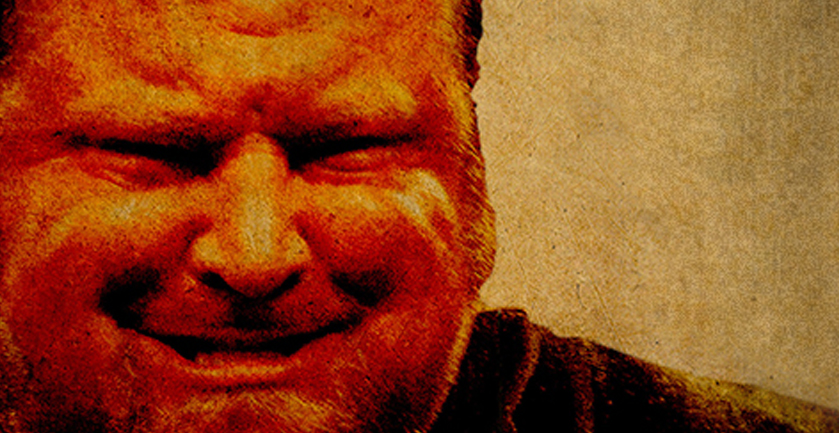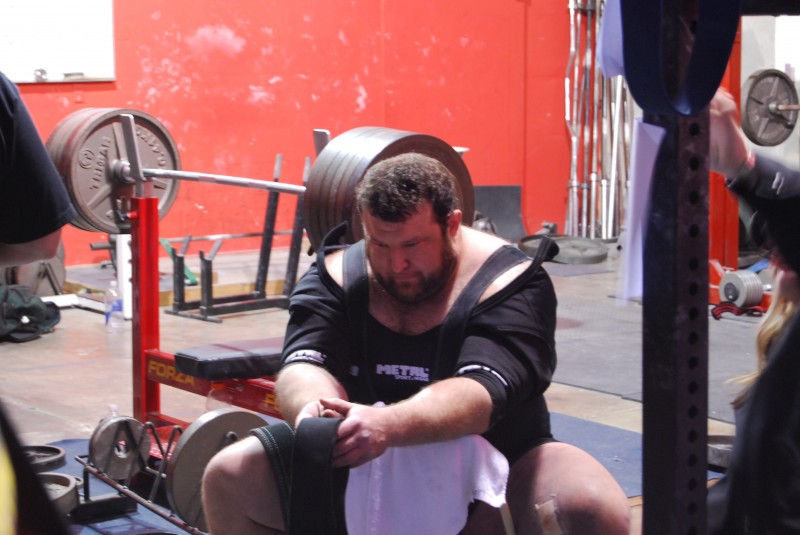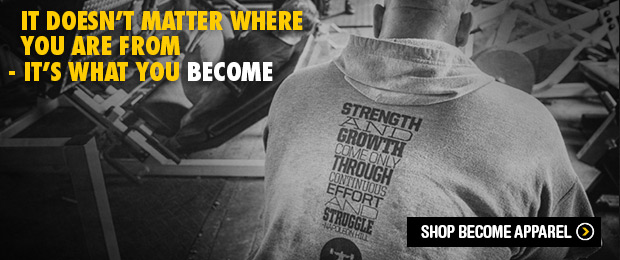
This whole series was spurred by Westside Vs. The World, but it only added to thoughts I have already had. I have written about how much respect I have for Louie and Westside and the influence they had on me. I have written about my journey to the top of powerlifting along with my mistakes. Now I am going to try to wrap it up and finalize my point about what we did wrong.
Training optimally and having that as a theme that runs 24/7 throughout your life is dedication. If you’re training so hard that you’re constantly getting injured, then you’re not training optimally. Most injuries started way before you see them as injuries. They are from weeks, months, and years of heavy training without getting the chance to fully recover. They are often from poor technique, bad movement patterns, and lack of mobility. Basically, if you are overtraining more than every once in a while, you’re not training optimally.
RECENT: Chad vs. The World: Widening My Tunnel Vision
Signs of this are depression, lack of appetite, personality changes, poor sleep (starts with waking a lot), losing flexibility and mobility, irritability, decrease in dynamic ability, decreased motivation, and a decreased sense of well being. Ironically, once we get to a bad stage of overtraining, our thinking becomes as tweaked as our personalities do. At this point, it is crucial to make clear intelligent decisions, but we are not in the right mind to do so. Instead, we make poor decisions that usually only send us deeper.

I know I have done this many, many times in my lifting career. I was so close to busting out the biggest total of all time and all I needed to do to reach it was give my body a little more time to recover. Instead, I decided I just had to work harder and with more intensity, which pushed me so far over the edge that I did not want to lift for the first time in my life.
It is at this stage that we completely fool ourselves. We tell ourselves we are dedicated and use that to justify our actions. Come on, it is not dedication that keeps us from going to a child's sporting events. It is not dedication that makes us miss holidays with our family. The real motivation for this is the fear of losing strength, being seen as undedicated, or being outworked. So similar are the lifters that hit openers just days before competition after believing they cannot even take a week off. These are all misguided and just plan bullshit fears. They are based on emotions, not logic or intelligence.
Listen up, I am not writing this article to bag on Westside or any of its lifters. Louie, Westside, and so many of its lifters have been absolutely amazing to me over the years. There is so much great knowledge to be learned from Westside Barbell, but I believe there are lessons of what not to do as well.
Louie and Westside Barbell are icons in powerlifting, and they came out with more incredible information than any other gym on this planet that is being used to this day by many pro sporting teams to current world record holding strength athletes. Westside lifters reached levels of strength unheard of in their time that made everyone else have to up their games or be left behind. Their dedication and sacrifice to the sport were completely incredible and most people on this planet will never come close to it in any aspect of their lives.
In my mind, that is an amazing thing, to put everything you have in one direction. Still, even the smartest, strongest, and best of us can learn and improve on what we do or how we do it. The journey for strength is all about education and learning, and this is how we continue to get stronger.
If I have not been clear, the biggest mistake I think we all made is that we pushed too hard. Maybe we were over dedicated or maybe our dedication was misguided. Everything in life and nature has some balance or it ceases to exist. If you tip the scale too far it flips over. There cannot be an equal balance if you want to be one of the best at something but the scale must still stay upright.
In my case, I flipped the scale completely over and off the table. I do think I was on the right path, but I just did not commit to it as well as I should have. At the time, I was doing fewer intense training sessions than anyone else and focusing a lot on my recovery. Unfortunately, with my preexisting sleep issues and depression, it was still too much. My training to recover did not equal out. I can see now that all my injuries, sleep issues, depression, etc., were signs of this.
WATCH: Joe Sullivan Rants — Go to Therapy!
Throughout the documentary, you heard a lot of talk about injuries. Yes, at that level, injuries are going to happen, but they should not be so common or frequent. We should also not feel beaten up and sore every day. Yes, we will be sore and beaten up some days after super intense training sessions. The problem here is we get used to feeling beaten up and like shit. It becomes normal for us, and we tell ourselves this is what it takes.
I can’t tell you how many lifters I have gotten to actually back off some and they are surprised how much better they feel while getting stronger. They tell me how their muscles and joints feel better than they have in years. Before starting with me, they all said they felt normal and everything was fine. The human body adapts too well sometimes and we forget what feeling good feels like.
This often goes for our personality changes as well. Even in the documentary, they talked about lifters getting worse as they got closer to a competition. I can’t say why it was the case with them, but I do know many lifters I have worked with whose personalities change when they overtrain. These lifters I work with do not even recognize their personality changes until I talk to them about it. Then they begin to see how it changes them and how many times they have actually been through it. They see how they start getting depressed, kind of anti-social or closed off, talk less, develop shorter tempers, and lose interest in things that used to make them happy. It gets worse and worse until full-on depression hits.
Sleep issues appear in a similar manner. Most lifters will not notice the changes because they happen so slowly. Then, even when they do see it, they don’t care unless the gains are stopping. They do not realize that even if they are making gains, they could be making better gains with sleep while feeling better while doing it.
These are signs all lifters, coaches, and training partners should be aware of. If these people are not asking questions based on this stuff, you need better different people around you or you need to educate them on this.
I cannot impress enough that strength is a long game. My first meet I totaled 1,700 pounds, and 10 years later, I totaled 2,700 pounds. I am actually pretty proud of that, and it took 10 damn years. If you go into this just trying to gain too fast and have completely unrealistic expectations, you will never last. You will end up giving up or injuring yourself so bad your out for good.
Strength is a very long journey, and there are never-ending amounts of knowledge that need to be learned. What works now will not work later. What got you to the level you are will not necessarily get you to the next level. What worked at 20 years of age will not work at 40 years of age.
Settle in and accept the journey. Work to build a set of principles that you can always look to when it gets tough — the biggest of which should be the goal of learning to listen to and trust your own body. It already knows what to do if we would only get out of our own way.
READ MORE: The Mind-Muscle Link: Engagement and Focus
I am a believer that there is not much fairness in the world. Some die young and shouldn’t, while some get rich and are complete assholes. Some do everything wrong and get ahead while some do it all right but get nowhere. I never understood it, and probably never will.
Strength makes sense to me, and it seems to follow a right and wrong. If you train hard, intensely, intelligently, and use your mind you will make gains. If your train stupidly, you will get stuck or hurt.
When I started out, I had to train hard and make mistakes; they were part of my learning and had a purpose. As I learned and got stronger, I found I could not train as often and still recover. When I reached the top level, I should have realized that I needed — or better yet, earned — more time off and do things outside the gym.
Doesn’t it seem fair that you reach a level after busting your ass for so many years and that being 100 percent dedicated means you have some room for more things outside your lifting? Being dedicated does not change but the actions of being dedicated change with our level of strength. We must learn to redefine dedication.
If you or a loved one needs help, reach out to these resources. All hotlines listed below are available 24/7 and are confidential unless otherwise noted. In case of an emergency, call your local authorities.
- The National Suicide Prevention Lifeline (U.S.): 1-800-273-8255
- Crisis Text Line (U.S.): Text "START" to 741741
- National Domestic Violence Hotline (US): 1-800-799-7233
- Veterans Crisis Line (U.S.): 1-800-273-8255, press 1
- Rape, Abuse and Incest National Network/RAINN (U.S.): 1-800-656-4673 or hotline.rainn.org/online
- The Trevor Project (U.S. crisis intervention for LGBTQ+ youth): 1-866-488-7386, text "START" to 678678, or instant message a counselor at thetrevorproject.org/get-help-now
- TWLOHA (U.S.): Text "TWLOHA" to 741741
- Free online chat-counseling and therapy from trained volunteers (international): 7cups.com
- International lists of suicide hotlines and resources: suicide.org/international-suicide-hotlines.html and twloha.com/find-help/international-resources











Pick your battles, I like that. It is a tough thing to do and seems like it takes a lifetime to master and once you master it then you have to work to keep it mastered. It is worth it though!
Thanks,
Chad